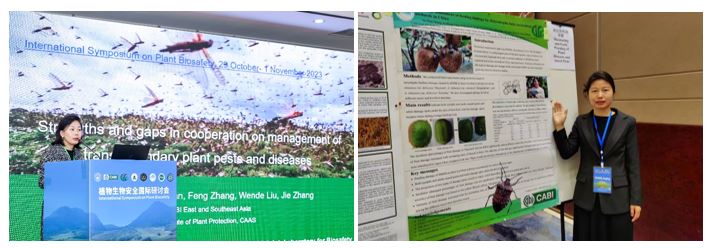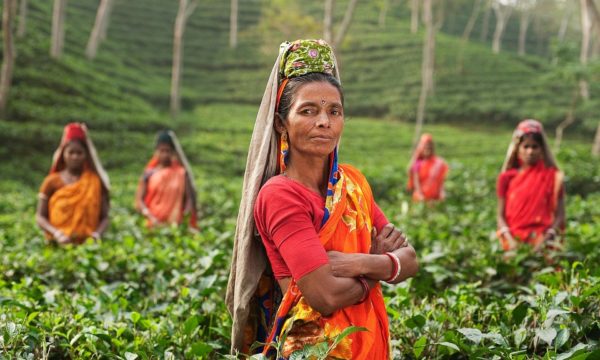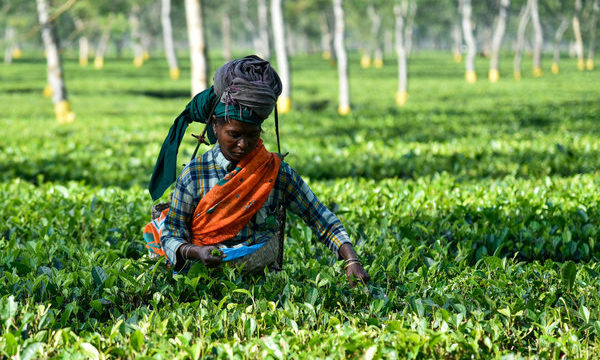
The Chinese Ministry of Agriculture and Rural Affairs (MARA)-CABI Joint Laboratory for Biosafety (Joint Lab) is celebrating a successful 15 years of agricultural science and innovation towards more sustainable food security in China. The celebration ceremony was witnessed by some 300 participants from 16 countries attending the International Symposium on Plant Biosafety (ISPB) in Kunming, China.
The Joint Lab, which is based in Beijing and affiliated to the Institute of Plant Protection, Chinese Academy of Agricultural Sciences (IPPCAAS), provides a platform for research and development collaboration, a centre for training and scientific exchange, an open platform for joint collaboration with third parties, and a consultancy service for the Chinese government.
Triangular collaboration and South-South cooperation
The Joint Lab has played an important role in triangular collaboration and South-South cooperation since it was launched in 2008.
This includes initiatives for the facilitation of agricultural technology transfers from China to other countries under the ‘Chinese Technology Going Global’ programme as well as the ‘Belt and Road Initiative.’
The Joint Lab has worked on over 40 international projects – involving more than 80 Chinese and international organizations from 33 countries– with funding worth a total of around USD $36 million.
In 2021, a CABI study reviewed the achievements of the Joint Lab and showed that it provides excellent value for money with an investment-benefit ratio of 1:4.
The Lab has contributed to Chinese and global needs for food and nutritional security, food safety, greater innovation, and sustainable development, with a focus on the biological control of Invasive Alien Species (IAS) and environmentally friendly biological solutions for key transboundary crop pests and diseases.
Dr Daniel Elger, CABI CEO, speaking at the celebration ceremony of the 15th anniversary of the Joint Lab after opening remarks given at the ISPB in Kunming, said “CABI and China have had a long history of successful partnership, particularly through the Joint Lab.”

He added that the Joint Lab “has driven innovation and outputs of real relevance to both Chinese and global needs in food and nutritional security, plant biosafety, food safety and sustainable development.”
Professor Wu Kongming, President of CAAS (the first Co-Director of the Joint Lab for China), said, “The Joint Lab has played an important bridging role in some major triangular collaboration and South-South cooperation initiatives including the facilitation of agricultural technology transfers from China to other countries under the ‘Chinese Technology Going Global’ programme during the past 15 years.
“Building on what has been achieved, China looks forward to deepening our collaboration with CABI towards win-win partnerships among China, CABI and CABI’s other Member Countries to ensure global food security and contribute to the realisation of the SDGs.”
Dr Wei Zhenglin, Deputy Director General for International Co-operations at MARA (also CABI’s new Executive Council member for China), said, “The recently concluded ‘Belt and Road Summit’ held in Beijing stressed the importance of scientific and technological innovation – working with other countries to promote scientific and technological exchanges, build joint laboratories, and transfer technology.
“The Joint Lab will, therefore, have an even more important role to play, and greater opportunities for strategic research and innovation contributing to this important initiative and helping more of CABI’s Member Countries in their endeavours to ensure national food security.”
Outstanding contribution awards
At the celebration, outstanding contribution awards were given to Dr Zhong-Wei Liu, Dr Qiaoqiao Zhang, Professor Xue-Ping Zhou, Dr Feng Zhang, Dr Stefan Toepfer, and Professor Zhen-Ying Wang in recognition of their efforts in the establishment of this important platform for joint research, capacity building, scientific exchange, and technology transfer. CAAS President Kongming Wu and CABI Global Operations Executive Director, Dr Ulrich Kuhlmann, presented the awards.

During the ISPB, Dr Kuhlmann delivered a keynote speech on the importance of pest preparedness approaches to improve food security and food safety, sharing some of CABI’s work to help smallholder farmers combat crop pests and disease outbreaks through CABI’s digital tools under the PlantwisePlus programme.
This includes the Crop App Index which is helping extension workers and smallholder farmers discover more than 1,000 tools to support decision making in crop production and plant health. In other CABI contributions to the meeting, Dr Ivan Rwomushana gave a plenary presentation on horizon scanning for prediction of plant health threats in Africa, focusing on the use of CABI’s Horizon Scanning Tool.
Dr Feng Zhang and Dr Toepfer chaired a plenary session and a thematic session, respectively. Two thematic presentations were given by Dr Hongmei Li and Dr Toepfer.
Five posters were presented by the Joint Lab team. Three posters by Jin-Ping Zhang, Yuanyuan Cheng and Yasir Ali, received the best poster awards.

The Joint Lab team has been recognized for their achievements, including through several prestigious awards. Furthermore, young scientists, international doctoral students, postgraduate and undergraduate students have been trained through the Joint Lab.

In recent years, the Joint Lab has built a global network, establishing the ‘MARA China-CABI European Laboratory’, ‘the Anhui-CABI Joint Laboratory for Agricultural Pest Control’, the ‘Yunnan-CABI Joint Laboratory for Integrated Prevention and Control of Transboundary Pests’ and the ‘Shandong-CABI Joint Laboratory for Biological Control’, and formed strategic partnerships with organisations in Malaysia, Laos, Pakistan, and Kenya.
Many more years of successful collaboration
Dr Kuhlmann (the Co-Director of the Joint-lab for CABI), said, “15 years of outstanding research and innovation towards our shared vision of more sustainable food security have made the Joint-Lab one of the top institutions of its type within the Chinese agricultural research and development community. We stay ready to embrace more challenges and look forward to many more years of successful collaboration.”

Going forward, the Joint Lab will have an expanding role in supporting both China’s national planning objectives and international collaborations between China and other CABI Member Countries, particularly Member Countries in the Global South.
Additional information

Main image: The Joint Labhas made great achievements since it was launched in 2008 (Credit: CABI & IPPCAAS).
Video
Study brief
See also the study brief ‘MARA-CABI Joint Laboratory: 12 years of achievement.’
Relevant stories
‘China visit strengthens partnership for sustainable food security.’
‘Partnership with MARA, China strengthened with Senior MARA Delegation Group visit to CABI.’
‘New Yunnan-CABI Laboratory to help ensure greater food security in Southwest China.’
Related News & Blogs
Tripartite collaboration highlights sustainable biological control to fight crop pests in China and South-East Asia
The power of tripartite collaboration has been highlighted at a workshop focused on sustainable biological control and Integrated Pest Management (IPM) to fight a range of major crop pests in China and South-East Asia, particularly Malaysia. CABI, the…
22 January 2025


